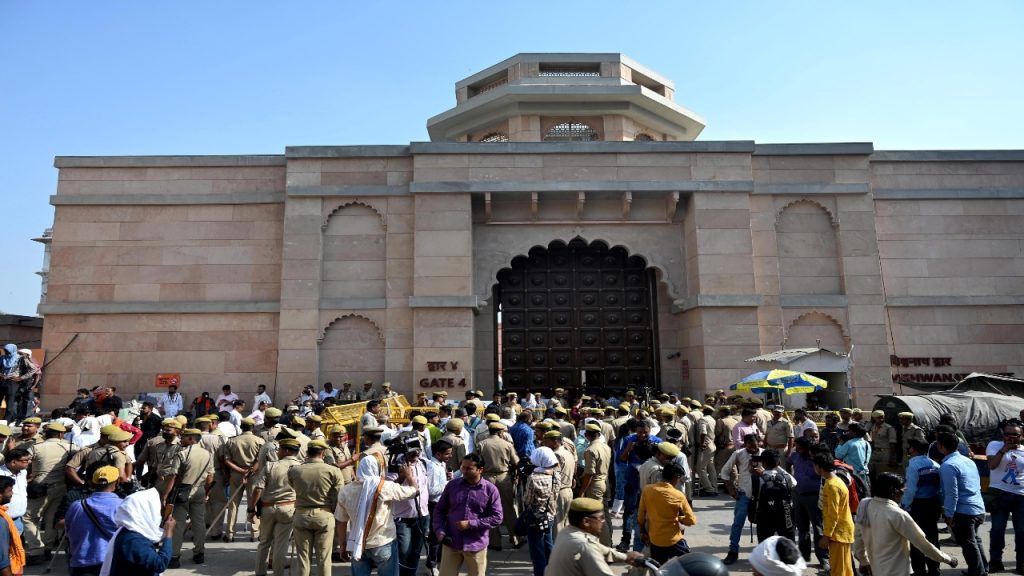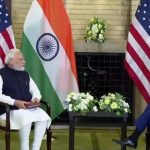By Priyanshi Bhageria
A Hindi couplet by an unknown writer has been going viral on social media recently. Its English translation goes thus, “Birds feed on grains at the temple, and drink water at the mosque/I have heard that Radha’s stole is sewn by one Salma Begum/One Rafi used to sing ‘Raghupati Raghav’ at all gatherings/One Premchand used to recite ‘Idgah’ to children/…Where others would see Hindu or Muslim, I see the human in them…” This aptly describes the idea of a secular India.
Recently, the Supreme Court has refused to put a stay on the videographic survey of the Maa Shringar Gauri Sthal at the Kashi Vishwanath temple-Gyanvapi mosque complex, ordered by a Varanasi civil court. The survey of the complex was challenged citing the Places of Worship (Special Provisions) Act, 1991. The legislation was enacted during the term of an Indian National Congress-led Union Government in light of the Ram janmabhoomi rath yatra which had led to a lot of communal disharmony.
The relevance of this legislation has been brought into fresh relief owing to the new suit filed for the change in religious character of the mosque by claiming that a ‘shivalinga’ has been uncovered at the site. Hence, it becomes important to understand what the relevant provisions of the Act are, as well as its constitutional validity, in light of the new dispute.
The objective of the Act is to discourage communal disharmony. Section 4(1) states that the religious character of a place of worship existing on August 15, 1947 shall continue to be the same as it existed on that day. While Section 4(2) bars the institution of any fresh proceedings for the change of religious character of places of worship. It also stipulates that any pending proceedings in this regard shall stand abated. Section 4(3) lists down exceptions to the same. Sub-clause (b) of the section states that the Act will not apply to appeals, suits and proceedings which were decided before the commencement of the Act.
Section 3 explicitly puts a bar on the conversion of places of worship.
It is interesting to note that Section 2(c) defines ‘places of worship’ in wide terms to include any place of public religious worship of any religious denomination or any of its sections, called by whatever name. This highlights the intention of the lawmakers with regard to their commitment towards abating any such conversion of places of worship, which can be a cause of communal disharmony and lead to deprivation of secular character of the nation.
Section 6 penalises acts violative of section 3 with imprisonment of up to three, in addition to the payment of a fine.
The constitutional validity of the Act has been challenged by two petitions filed by Lucknow-based Vishwa Bhadra Pujari Purohit Mahasangh and some followers of Sanatan Vedic Religion, and Bharatiya Janata Party leader Ashwini Upadhyay. Both of these petitions are pending before the Supreme Court. The court issued a notice in Upadhyay’s petition in March 2021; however, the Union Government has not filed any reply yet.
The Act has been challenged on the ground that it prohibits the power of judicial review, which is part of the basic structure of the Constitution. Additionally, the petitioners also contend that its provisions are violative of Articles 14, 15, 21, 25, 26 and 29 of the Constitution, and find the cut-off date of August 15, 1947 arbitrary.
Previously, the Supreme Court has expressed its opinion on the constitutional validity of the Act on two occasions. On both these occasions, the matter of its constitutional validity was not brought up before it.
First in 1994, in M. Ismail Faruqui versus Union of India, the Supreme Court opined that there are similar provisions in the Indian Penal Code that seek to abate communal disharmony. Hence, it was of the opinion that no legislative instruments could possibly tackle this menace.
Later in 2019, in its judgment in the Ayodhya title dispute case, the Supreme Court took a different view. Delivering its verdict, the Constitution bench touched upon the constitutionality of the Cct. It held, “The State, has by enacting the law, enforced a constitutional commitment and operationalised its constitutional obligations to uphold the equality of all religions and secularism which is a part of the basic features of the Constitution. The Places of Worship Act imposes a non-derogable obligation towards enforcing our commitment to secularism under the Indian Constitution… The Places of Worship Act is thus a legislative intervention which preserves non-retrogression as an essential feature of our secular values.”
Further, on the question of the cut-off date, the court has an unambiguous answer. It said that on August 15, 1947, India distinguished itself as a nation with no official religion. Hence, such an enactment is only in furtherance of such commitment.
Therefore, it seems that the Supreme Court, in its most recent judgement on the constitutionality of the Act has made its stance unambiguous and was inclined towards upholding the Act.
The next question before us would be its contemporary relevance in light of the latest Gyanvapi mosque dispute. Consider the law as laid down in Section 4(2), which explicitly puts a bar on the institution of any fresh legal proceedings which seek to change the religious character of a place of worship as it stood on August 15, 1947, as well as states that pending proceedings would also stand abated.
In 1936, three Muslim petitioners had earlier demanded that the entire complex be declared a mosque. However, this petition was dismissed by the Allahabad High Court in 1942.
This implies that there are no pending proceedings and even if there were any, the same would have not made a difference as long as the Act withstands the test of constitutionality.
Another major development in this regard has unfolded in Mathura, where a civil court has held that the Act will not apply to the Krishna Janmabhoomi dispute. The petitioners in this case contend that a compromise decree between Shri Krishna Janmasthan Seva Sansthan and ShahiIdgah Trust came into existence in 1974. The district judge has, therefore, applied Section 4(3)(b) to that particular suit as the compromise decree was a subject matter in the challenge to the suit. However, the same cannot be said for all the petitions filed for the same dispute because, first, the nature of the compromise decree and the authenticity of the same is questionable; and second, the compromise decree is not made the subject matter in all the appeals/suits.
It is reported that as many as 8-10 petitions are filed at the Mathura civil court itself surrounding the issue of Krishna janmabhoomi. Even if we take this holding to be correct, there is no decree/ruling of either a court or a tribunal that has conclusively dealt with the matter of the Gyanvapi dispute.
Therefore, as the situation stands today, the suit at the Varanasi district court is not legally sustainable as it aims to alter or change the religious character of the Gyanvapi mosque complex, which fits the definition of place of worship as given under the Act. (IPA Service)
Courtesy: The Leaflet

 Narendra Modi Is Now Following U.S. President Joe Biden In Most Global Issues
Narendra Modi Is Now Following U.S. President Joe Biden In Most Global Issues 